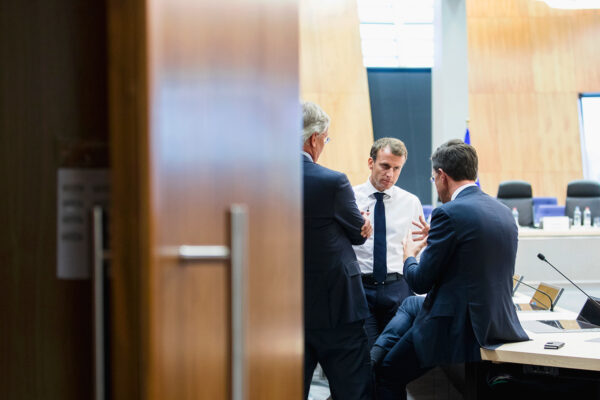
If Italians and Spaniards are under the impression that the Netherlands is refusing to help them cope with the impact of coronavirus disease, their own leaders share the blame with the Dutch’s lack of tact.
Giuseppe Conte and Pedro Sánchez have unwisely elevated the one policy they should have known the Dutch could not accept into the test of European solidarity: eurobonds.
Marshall Plan
Sánchez has called for a rescue effort on the scale of the Marshall Plan, but the EU is already spending, or planning to spend, ten times what America gave postwar Europe in 1948 ($12 billion, which would be $130 billion in today’s money):
- The European Central Bank is purchasing €750 billion worth of corporate and government bonds to inject money into the economy, providing cheap loans to banks, especially if they loan to small and medium-sized businesses, and relaxing buffer requirements for banks.
- The European Commission has suspended rules on deficits and state aid to allow member states to bail out businesses and pay the salaries of workers. It is giving €80 million to a vaccine manufacturer in Germany, paying for repatriation flights and proposing to spend €100 billion on short-time work measures to keep people employed.
- The European Parliament has voted to divert €37 billion in structural funds to the regions worst affected by the coronavirus outbreak.
- The European Investment Bank is mobilizing €40 billion in loans to small and medium-sized businesses.
All this comes on top of national efforts. Germany is borrowing €156 billion to make up for lost tax revenue and fund higher social spending. It is also setting up a €600 billion rescue fund for companies. Spain has a €200 billion rescue plan, worth one-fifth of its annual economic output, €117 billion of which is public money. The Dutch can afford to spend €90 billion more this year even without breaking the EU’s deficit ceiling.
Dutch finance minister Wopke Hoekstra has proposed freeing up half of the European Stability Mechanism’s €500 billion lending capacity to support crisis-struck countries.
The one thing neither Hoekstra nor his prime minister, Mark Rutte, will endorse is pooling European debts.
Reputation
If that causes either to be seen as “Mr No” in Europe, it is a reputation neither Hoekstra, a Christian democrat, nor Rutte, a liberal, will mind. Their parties compete with far-right Euroskeptics for votes.
But it is inaccurate. The Netherlands doesn’t oppose “more Europe”. Proponents of eurobonds tend to portray them as the only way forward — and opposition as narrow-minded and Euroskeptic. If you’re generous, you could attribute this to a lack of imagination.
The Dutch will not be cowed into “transfer union”, the permanent subsidization of economically weak member states by the strong. The more appeals to European “solidarity” involve them paying for the sins of countries with higher debts and better weather, the less impressed the Dutch will be.
Consequence of Brexit
The Dutch used to follow Germany’s lead, where opposition to eurobonds is softening. The reason is economic dependence: the Dutch sell more to Germany alone than to Britain, France and Italy combined.
Brexit has forced them to step out of Germany’s shadow.
I predicted Dutch diplomacy would change after Britain voted to leave the EU:
For years, the trading nation could rely on the United Kingdom to provide a counterweight to the Mediterranean bloc and its protectionist tendencies. Now the fear in The Hague is that Britain’s exit from the EU will lead to a renewed focus on political, as opposed to economic, integration.
Less than a year after the Brexit referendum, Emmanuel Macron won the presidential election in France on a platform of closer European Union.
Rutte warned that integration for integration’s sake would fan the flames of Euroskepticism. The anti-euro Freedom Party was polling in second place at the time to his center-right liberals. Rutte broke with Germany, suggesting it could transfer more money to Brussels if it wanted to. “We take a different view.”
The Dutch formed a coalition with Austria, Belgium, Luxembourg and the Baltic and Nordic states against Macron when he called for a eurozone budget. (Germany wasn’t wild about it either, but it didn’t want to be seen as blocking it.)
The same countries, dubbed the “New Hanseatic League” after the medieval Northern European trade confederation, resisted a Franco-German push for protectionism after the European Commission had blocked a landmark merger of the French and German train manufacturers Alstom and Siemens.
Different vision
Yet Dutch support for the EU is up since Brexit. Anti-EU parties have lost seats. There is no groundswell of Euroskepticism. Rutte, who once toyed with kicking Greece out of the euro, told the European Parliament in 2018 that the return of authoritarianism and protectionism around the world means the EU must be more than a single market.
“More Europe” for him means more ambitious climate goals (at home, Rutte had to store down a Yellow Vests-like farmers’ revolt to drastically cut emissions), closer coordination on immigration, finalizing the single market in (digital) services, liberalizing labor markets and leading the world in free trade.
That may not be the vision of Europhiles in Italy or Spain, but it isn’t any less reasonable or legitimate than theirs.
